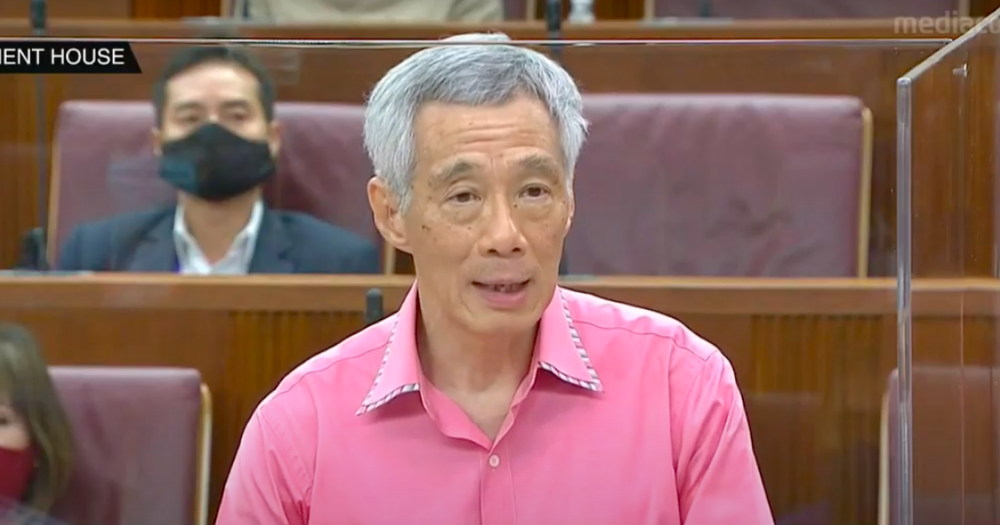Prime Minister Lee Hsien Loong spoke in Parliament on Wednesday (Sep. 2) about the social safety nets the government has put in place to help support Singaporeans.
At the same time, he noted the importance of ensuring that the country's social programmes remain fiscally sustainable, so that they do not draw unnecessarily on Singapore's reserves.
Didn't need extensive social safety nets in early decades
"Social safety nets are there to protect the vulnerable in our society, and ensure that everyone has full access to opportunities to improve their lives," PM Lee said.
He stated that, in Singapore's early decades, the country did not need extensive social safety nets, because GDP was high and employment opportunities were aplenty and growing.
The government invested heavily in social infrastructure — such as universal education, basic healthcare, and public housing — which improved everyone's standard of living and "levelled everyone up" by "giving them the means to improve their lives through their own efforts".
However, Singapore is now in a different phase of development, due to the economy maturing, incomes growing less rapidly, and a higher premium being placed on specialised skills and education.
This has made it such that, when someone loses their job, it is harder for them to get another job, he said.
PM Lee highlighted some of the schemes that the government has put in place to progressively strengthen these social safety nets over the past 15 years, particularly for lower-income households: ComCare, Workfare and Silver Support.
He also outlined that the government has expanded the coverage of some schemes and subsidies to include middle-income households as well, such as preschool subsidies and bursaries for universities and other post-secondary institutions.
Altogether, he said, the government spends three times as much on social programmes every year now as it did 15 years ago.
Social safety nets for Covid-19 and the new normal
However, the Covid-19 pandemic showed that these measures were not enough during the pandemic crisis, Lee said.
He highlighted the emergency measures that the government implemented during this time: the Jobs Support Scheme (JSS), Self-Employed Income Relief Scheme (SIRS), COVID-19 Support Grant (CSG), and the Jobs Growth Incentive (JGI).
These measures, which required the government to draw on past reserves, are "crucial for now, but they cannot continue indefinitely".
The new normal will likely see more economic uncertainty and turbulence, PM Lee said, and the government's approach to continuing to strengthen social support to its people must continue to be as it has always been: pragmatic and empirical.
Meet workers' needs in targeted manner
This means making the best use of Singapore's resources to meet the needs of different groups in our society in a targeted manner, such as older workers and low-wage workers.
PM Lee contrasted how solutions such as unemployment insurance can offer older workers temporary relief, but retraining and upskilling them will help them find a new job more easily, if they were to get retrenched.
"The best unemployment insurance is in fact the assurance of another job," he said.
PM Lee also highlighted the Workfare Income Supplement and the Progressive Wage Model as schemes to help low-wage workers.
The government's efforts have paid off, he said, as older workers are staying in the workforce longer, and the real wages of the country's bottom quintile have consistently grown faster than median wages over the past five years.
Programmes must be fiscally sustainable
However, PM Lee acknowledged that greater challenges lie ahead. Singapore should take some time to assess the landscape after Covid-19, to see how things unfold, and what specific problems develop.
He pushed back at some of the suggestions that have been raised by opposition politicians:
"It is not just floating ideas like minimum wage and unemployment insurance, but assessing their impact carefully....
We must identify pragmatic solutions which will make a real and sustainable difference, and give people justified assurance that when they need help, they will get the help that is relevant to them.
And it must not create new problems in the process, for example, by eroding our spirit of self-reliance."
PM Lee stated that the "permanent imperative" is to keep programmes fiscally sustainable, and that social safety nets should be paid for out of current revenues.
He criticised the opposition politicians who have asked the government to reveal how much Singapore has in its reserves before deciding whether to support the government's Budget and tax plans:
"Basically [the opposition today] are asking: I have something in the bank already. How much of that can I touch? ...
This was not the attitude of our forefathers, the founders who were building for the future, but the attitude of inheritors who think they have come into a fortune, and want to consume the fruits of their predecessors’ labours."
This, he said, is "fundamentally the wrong approach", and that Singapore today should keep the attitude of the founding generation and "live within our means":
"That is the way to build Singapore for the long term, and secure the future for our children and grandchildren."
Related story:
Totally unrelated but follow and listen to our podcast here
Top photo via CNA.
If you like what you read, follow us on Facebook, Instagram, Twitter and Telegram to get the latest updates.
